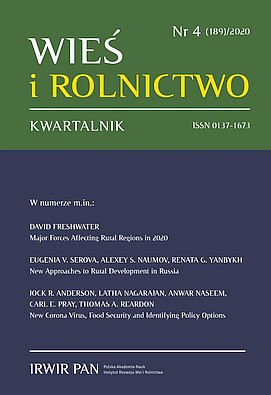Główne siły oddziałujące na regiony wiejskie w 2020 r.
DOI:
https://doi.org/10.53098/wir042020/01Słowa kluczowe:
rozwój wsi, podział miasto – wieś, konflikt społeczny, polityka wiejska, populizmAbstrakt
Regiony wiejskie w krajach OECD zawsze borykały się z wyzwaniami rozwojowymi wynikającymi z: zależności od zasobów naturalnych, niewielkich zasobów pracy, dużych odległości od rynków, a także skutków globalizacji. Obecnie ich możliwości rozwojowe są dodatkowo ograniczone przez: wymagania wynikające ze zmian klimatycznych, zwiększoną niestabilność i „wrażliwość” gospodarczą – wynikającą z pandemii COVID-19, utrzymujące się skutki recesji z 2008 r. oraz nierównomierny wpływ gospodarki internetowej. Jednak z perspektywy polityki rozwoju obszarów wiejskich być może najważniejszym nowym wyzwaniem może okazać się wzrost populizmu na wsi. Mieszkańcy obszarów wiejskich od dawna są odmiennie postrzegani niż mieszkańcy miast, w ciągu ostatnich dwóch dekad różnice między tymi grupami wzrosły. Co ważne, chociaż początkowo postrzegano internet oraz technologie informacyjno-komunikacyjne (ICT) jako narzędzia, które mogą poprawić spójność społeczną oraz integrować różne obszary oraz ludność miejską i wiejską, to obecnie wydaje się, że zamiast tego spowodowały zwiększenie napięć między nimi. Ponieważ podstawowe wartości mieszkańców miast i wsi kształtowały się odrębnie, dlatego bardzo się różnią i trudno jest osiągnąć polityczny kompromis wymagany do stworzenia skutecznej polityki rządów krajowych. W konsekwencji zmniejszają się szanse na to, że rządy krajowe będą w stanie stworzyć i wdrożyć spójną politykę rozwoju obszarów wiejskich.
Bibliografia
Champion T. (2007). Defining “urban”: The disappearing urban-rural divide. In: Geyer H.S. (ed.), International Handbook of Urban Policy, vol. 1 (pp. 22–37). Cheltenham: Edward Elgar. DOI: https://doi.org/10.4337/9781847208651.00010
Filene P. (1970). An obituary for the “Progressive Movement”. American Quarterly, 22 (1), 20–34. DOI: https://doi.org/10.2307/2711670
Frank Th. (2004). What’s the Matter with Kansas? New York: Henry Holt and Company.
Freshwater D. (2000). Rural America at the turn of the century: One analyst’s perspective. Rural America, 15 (3), 2–7.
Freshwater D., Trapasso R. (2014). The Disconnect between Principles and Practice: Rural Policy Reviews of OECD Countries. Paris: OECD Publishing. DOI: https://doi.org/10.1111/grow.12059
Hodge I. (2003). Mainstreaming rural development policy under the CAP. Journal of Environmental Policy and Planning, 5 (3), 361–378. DOI: https://doi.org/10.1080/1523908032000171639
Holmes W. (1990). Populism: In search of context. Agricultural History, 64 (4), 26–58.
Isserman A. (2001). Competitive advantages of rural America in the next century. International Regional Science Review, 21 (1), 38–58. DOI: https://doi.org/10.1177/016001701761013006
JEC (Joint Economic Committee of Congress) (1986). The Bicoastal Economy: Regional Patterns of Economic Growth during the Reagan Administration. Washington, D.C.: Government Printing Office.
Mayhew A. (1972). A reappraisal of the causes of farm protest in the United States, 1870–1905. The Journal of Economic History, 32 (2), 464–475. DOI: https://doi.org/10.1017/S0022050700067206
Mudde C., Kaltwasser C. (2017). Populism: A Very Short Introduction. Oxford: Oxford University Press. DOI: https://doi.org/10.1093/oxfordhb/9780198803560.013.1
North D. (1966). Growth and Welfare in the American Past. Englewood Cliffs, NJ: Prentice-Hall.
Nugent W. (2009). Progressivism: A Very Short Introduction. Oxford: Oxford University Press. DOI: https://doi.org/10.1093/actrade/9780195311068.001.0001
OECD (Organisation for Economic Cooperation and Development) (2006). The New Rural Paradigm. Paris: OECD Publishing.
OECD (Organisation for Economic Cooperation and Development) (2010). Strategies to Improve Rural Service Delivery. Paris: OECD Publishing.
OECD (Organisation for Economic Cooperation and Development) (2016). OECD Regional Outlook: 2016. Paris: OECD Publishing.
OECD (Organisation for Economic Cooperation and Development) (2020). Policy Implications of Coronavirus Crisis for Rural Development. Paris: OECD Publishing. Available: http://www.oecd.org/coronavirus/policy-responses/policy-implications-of-coronavirus-crisis-for-rural-development-6b9d189a/
OTA (Office of Technology Assessment) (1991). Rural America at the Crossroads. Office of Technology Assessment. Washington, D.C.: US Government Printing Office.
Overman H., Gibbons S. (2011). The Future of Rural Policy: Lessons from Spatial Economics. SERC Policy paper 8. London: London School of Economics. Available: http://eprints.lse.ac.uk/59234/1/__lse.ac.uk_storage_LIBRARY_Secondary_libfile_shared_repository_Content_LSE%20Spatial%20Economic%20Research%20Centre_SUNAINA%20SERC_sercpp008.pdf
Parker E. (2000). Closing the digital divide in rural America. Telecommunications Policy, 24 (2), 281–290. DOI: https://doi.org/10.1016/S0308-5961(00)00018-5
Schaeffer P., Loveridge S., Weiler S. (2014). Urban and rural: Opposites no more! Economic Development Quarterly, 28 (1), 3–4. DOI: https://doi.org/10.1177/0891242413520089
Schoene M. (2019). European disintegration? Euroscepticism and Europe’s rural/urban divide. European Politics and Society, 20 (3), 348–368. DOI: https://doi.org/10.1080/23745118.2018.1542768
Ward N., Brown D. (2009). Placing the rural in regional development. Regional Studies, 43 (10), 1237–1244. DOI: https://doi.org/10.1080/00343400903234696
Weber B., Freshwater D. (2016). The death of distance? Networks, the costs of distance and urban-rural interdependence. In: Shucksmith M., Brown D. (eds.), Routledge International Handbook of Rural Studies (pp. 154–164). Routledge: New York.
Zerofsky El. (2018). The Gilets Jaunes movement. The New Yorker, December 13, 2018. Accessed June 26, 2020 at https://www.newyorker.com/news/news-desk/the-complicated-politics-of-the-gilets-jaunes-movement
Zitner A., Chinni D. (2020). How the 2020 election deepened America’s white-collar/blue-collar split. Wall Street Journal, November 24, 2020. Available: https://www.wsj.com/articles/how-the-2020-election-deepened-americas-white-collar-blue-collar-split-11606219208?mod=politics_lead_pos3
Pobrania
Liczba pobrań artykułu
Strony
Jak cytować
Numer
Dział
Licencja
Prawa autorskie (c) 2021 Wieś i Rolnictwo

Utwór dostępny jest na licencji Creative Commons Uznanie autorstwa 4.0 Międzynarodowe.










